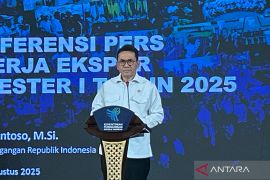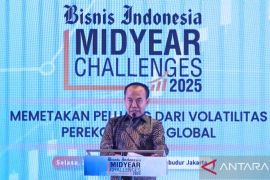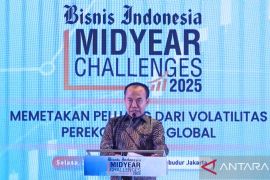Several cities have announced that they had to delay the implementation of the new ID program which was supposed to begin simultaneously on August 1, 2011, because they had not received at least two essential devices, namely biometrics for finger print records and IRIS eye retinal scanner reportedly imported from the United States.
The cities included Jakarta, Palembang (South Sumatra), Kupang (East Nusa Tenggara), Jembrana (Bali Province), Malang (East Java), Solo (Central Java), and Yogyakarta.
Home Affairs Minister Gamawan Fauzi has warned the companies to meet the delivery time targets.
The winning bidders for the E-ID equipment supply for the production of E-ID cards are state-owned printing company Perum PNRI, PT Sucofindo, PT. Sandhipala Arthapura, PT Len Industri, and PT Quadra Solution.
"We ask for a guarantee on timely supply. The time target must not be missed," Minister Gamawan said here on Tuesday.
He warned that if they violate the contracts, they would be penalized. The winning bidders must meet the contracts which have been agreed upon, especially regarding punctuality in the delivery of the goods, he insisted.
The home affairs ministry has allocated a total budget amounting to Rp6.3 trillion ($642 million) from the state budget for the application of the e-ID cards, including for the logistics such as cards, card readers, finger print scanners, cameras, signature pads, servers, and trainings for 40,000 operators in every district/city.
The e-ID card project has been long planned as part of a government initiative to give every citizen a single 16-digit identity number. Each card will display a photo, name and identity number.
The e-ID cards will have inserted-8-kb chips containing 27 kinds of information and using 10 finger-print and eye biometric system of each resident.
The information include marital status, blood type, parents` name and employment, physical or mental disabilities, birth certificate, divorce certificate, place and date of birth, biometric finger prints of all fingers and a photograph. Most of this information will be stored electronically.
The E-ID card program is implemented in two stages - the first stage is in 197 districts/cities including Jakarta in 2011, with a total target of around 67 million residents to get the new ID cards. And the second stage in 300 districts/cities in 2012 targeting around 105 million people.
Some 191 districts/cities throughout Indonesia are expected to receive all equipment for the E-ID cards production soon so they could begin issuing the new ID cards in August 2011.
The government has targeted to provide E-ID cards to 300 people per day, so the E-ID Card program in 197 districts/cities can be completed in late 2011.
The ministry`s population and civil record office head, Elvius Dailami said all logistics for the E-ID cards production must be fully distributed on August 15, 2011 at the latest.
"The distribution should be completed on August 15 at the latest, and the services could be started on August 18," he said.
In Jakarta, the delay in the logistics supply forced 10 "kelurahans" (urban village offices) to cancel the launch of the E-ID program process on Monday (August 1).
Ten kelurahans have been given a priority in receiving the logistics. The kelurahans are Kemanggisan and Tomang in West Jakarta, Kebon Sirih and Menteng in Central Jakarta, Cikoko and Mampang Prapatan in South Jakarta, Cipinang Cimpedak and Klender in East Jakarta, and Rawa Badak Selatan and Semper Timur in North Jakarta.
"The event is postponed because of a delay in logistics distribution by the home affairs ministry," Purba Hutapea, the Jakarta administration`s population and civil record unit head, said.
Of Jakarta`s 267 kelurahans, only 244 kelurahans have received E-ID card logistics. And even that some equipment are still lacking, so they are not yet functioning.
In total, the Jakarta administration is expected to receive among other things 707 computers, eye retinal and finger print scanners and signature pads, or two packages per kelurahan.
Only Menteng in Central Jakarta, and Cikoko in South Jakarta have received complete logistics.
In West Jakarta, of 56 kelurahans, only two, namely Tomang and Kemanggisan have received complete equipment for the new ID card program.
The 54 kelurahans have received computers and cameras only, and are still waiting to get other devices such as retinal and finger print scanners, Ahmad Fauzi of the West Jakarta municipality said here on Tuesday.
In Central Jakarta, of its 44 kelurahans, only two, namely Kebon Sirih and Menteng, had fully received the equipment, Mohammad Hatta, the head of Central Jakarta`s population and civil record unit, said here on Tuesday.
Having around 800,000 residents eligible to hold E-ID cards, Central Jakarta has targeted to complete the issuance of E-ID cards for its residents within three months or 100 working days.
To speed up the process, his office will open night services on September 28. "Hopefully it will be completed in late October," he told the press.
The North Jakarta authorities regretted the postponement of the E-ID program launch because the operators and field personnel were ready to perform their tasks.
Edison Sianturi, the head of the North Jakarta municipality`s population and civil record unit, expressed his disappointment about the delay.
The home affairs ministry had sent notices to 202 operators of the E-ID card programs in North Jakarta that the program would be delayed until August 18 or up to the second week of December 2011, he said.
Jakarta Governor Fauzi Bowo urged the suppliers of the E-ID card logistics to deliver the necessary equipment on time so the program could be implemented soon.
"The delay in the E-ID card operational schedule will affect the implementation in the field. The E-ID cards issuance might be late until next December," the governor said.
The delay in carrying out the E-ID card program in Jakarta and several other cities has prompted Abdul Malik Haramain, a member of the House of Representatives (DPR)`s Commission II, to urge the home affairs ministry to evaluate the program implementation nationally.
"The evaluation must particularly concern about the supply of electronic devices, the preparedness of the human resources or operators, and the time target for the implementation," Abdul Malik said. (*)
Reporter: By Fardah
Editor: Kunto Wibisono
Copyright © ANTARA 2011










